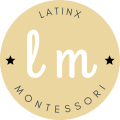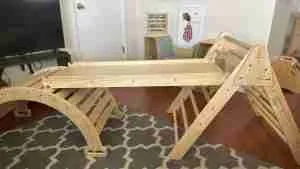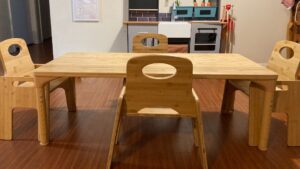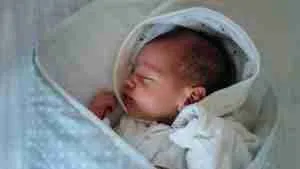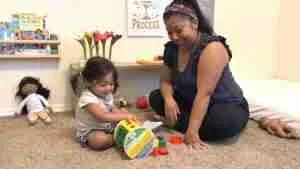
Should Babies Wear Shoes? 3 Life-Changing Things To Know
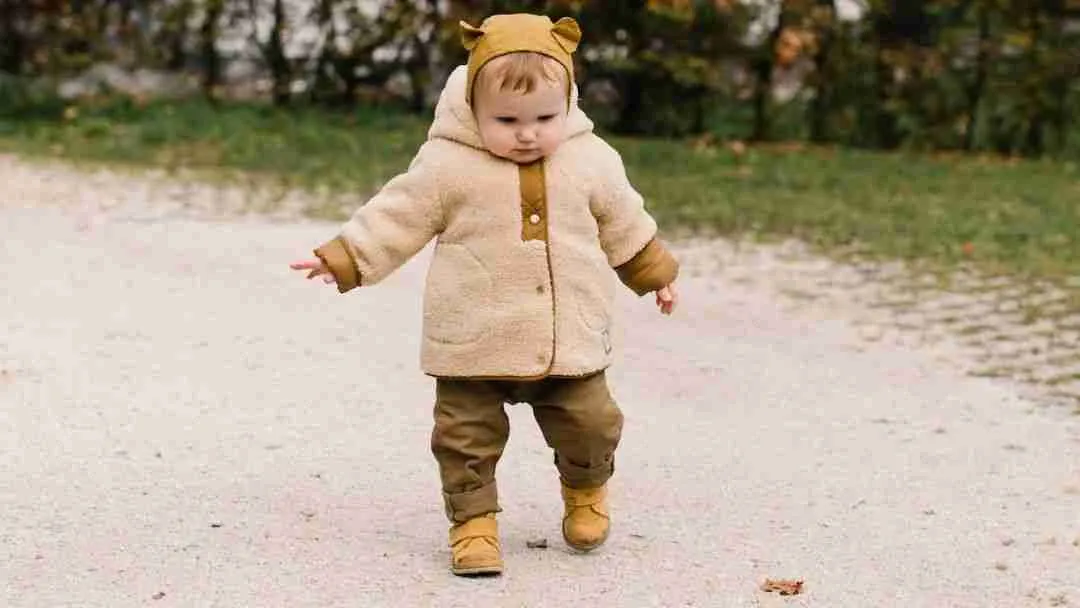
*Disclosure: I only recommend products I would use myself and all opinions expressed here are our own. This post may contain affiliate links that at no additional cost to you, I may earn a small commission. Thank you for your support!
Share this post
Should babies wear shoes?
No, your baby does not need shoes. According to the American Academy of Pediatrics, babies should only wear shoes once they begin walking outside.
When you are indoors, going barefoot is better for your baby’s foot development because they will naturally strengthen their muscles, ligaments, and tendons.
Other than for looks, shoes are made to protect their feet from harsh surfaces or sharp objects.
Your baby should only wear appropriate shoes made for newly walking babies when you spend time outside.
My baby’s first pair of shoes was the Ten Little First Walkers. These shoes are designed for babies learning to walk and support healthy foot development.
As a new parent, I learned a lot about baby shoes and foot development. I’ll share my experience with you in an easy-to-understand way.
What to look for in baby shoes
When the time comes to buy your baby’s first pair of shoes, I recommend you look for shoes with the following:
- APMA-approved. These are shoes that have been evaluated and approved by the American Podiatric Medical Association (APMA) and meet the standards of quality, safety, and effectiveness for promoting healthy foot development in babies and toddlers.
- Wide and foot-shaped toe box. A wide toe box allows your baby’s toes to spread and wiggle freely, and it should have a rounded shape that matches the natural shape of the foot. This prevents their toes from being squeezed, cramped, or deformed.
- Flexible sole. The sole should be soft and bendable so that it can follow the natural movement of the foot as your baby walks. It also allows your baby to feel the ground and use their muscles and joints to balance and coordinate their steps.
- No-skid soles. Your baby is learning a life skill and they need all the help to master it. No-skid soles can reduce the risk of falls and injuries, especially when your baby is learning to walk.
- Breathable materials. No one likes stinky feet! The shoe upper should be breathable to keep your baby’s feet cool, dry, and comfortable, and prevent overheating, sweating, or odor.
Shoes I recommend
I did lots of research when I bought my daughter’s first shoes. After testing various baby shoes, these are the ones I highly recommend.
Shoe | Cost | Sizes available |
$39 | 3 to 6 | |
$31+ | 3 to 13 | |
$40.42+ | 3 to 6 |
What happens if babies wear shoes too early?
This is the same question I asked myself.
Your baby’s bones are soft and their muscles, ligaments, and tendons are developing. Generic baby shoes are not elastic and do not expand as your baby’s feet grow.
Your baby’s feet will be squeezed and not develop properly if you cramp them in a pair of shoes too early. This could also lead to foot problems in babies, like those I mention below:
- Ingrown toenails. Tight shoes can cause the nail to grow into the skin and lead to pain and infection.
- Flat feet. This is normal in babies and toddlers because their feet are still developing. But shoes that do not support healthy foot growth can cause flat feet in the long run.
- Bunions. This is a bony part at the big toe joint and is caused by wearing tight, narrow shoes.
- Foot pain. Your baby can experience pain and swelling at the ball and heel of their feet.
- Hammer toes. This condition causes toes to bend permanently and can be painful.
Aside from these issues, inappropriate shoes for babies can prevent them from flexing and moving their feet as they learn to walk.
This can also hinder their balance and coordination as they restrict natural foot movement.
Barefoot is the way to go

When my daughter was learning to walk, we kept her barefoot when we were inside the house. Walking barefoot has so many benefits, especially in infants.
So when your baby begins to take those first wobbly steps, I recommend barefoot walking because it stimulates the nerve endings on the soles of the feet and enhances sensory-motor development.
This means that they can feel different textures, temperatures, and shapes of the ground and objects they touch with their feet, and this helps them learn about their environment and their own body.
One improvement I saw about walking barefoot was in my daughter was balance and coordination because this allowed her to feel the ground and adjust her posture.
Believe it or not, babies can sense how their weight shifts and how their muscles contract and relax as they move.
And this helps them develop a natural and efficient gait pattern that reduces the risk of injury and fatigue.
The biggest benefit, I think, from walking barefoot is that it allows for optimal foot development because it does not restrict the natural movement and growth of the bones, muscles, and ligaments in their feet.
Shoes that are not meant for new walkers can interfere with this process by providing too much support, cushioning, or stiffness.
And this can alter the shape and proper function of the foot and lead to the foot problems I mentioned previously.
So when can my baby start wearing soft-bottomed shoes?
From our personal experience, your baby can wear shoes when they walk outside. Remember that the purpose of shoes is to protect their feet.
My daughter wore her first Ten Little First Walker shoes at about 8 months. At this age, she was walking almost on her own. She held our hands for help.
She began walking independently at 9 months, and this was the time when we spent a lot of time outdoors.
We went on short hikes, to the park, and splash pads. It was so amazing to see her explore her surroundings all on her own!
What to do next?
Your baby does not need shoes. Walking barefoot is always the best option to help your baby walk and improve their development.
But once you are ready to step outside and let your baby run wild, the Ten Little First Walkers shoes will protect their feet and nurture healthy foot development.
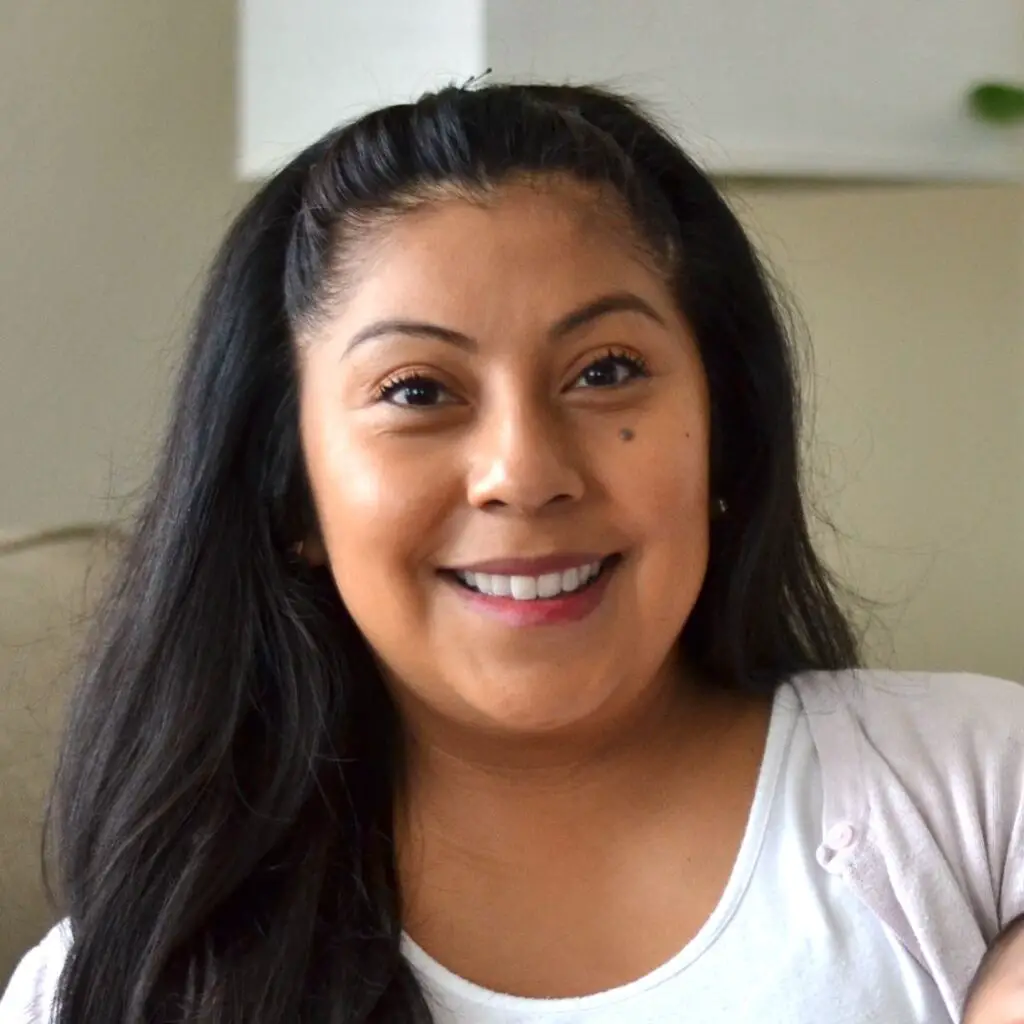
Hello, I am Leslie. I am on a mission to help you support the growth and development of your child. With the right tools and proper guidance, you can navigate parenthood with confidence and assertion! My goal is to equip you with knowledge to help you construct a strong foundation for your child’s life.
Suggested articles
You May Also Like
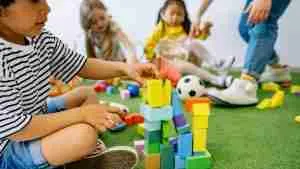
What is Montessori Play? And why it works
Montessori play is a method that helps children learn practical life skills in a fun and engaging way. Activities are done because a child enjoys them, not to accomplish an end goal.
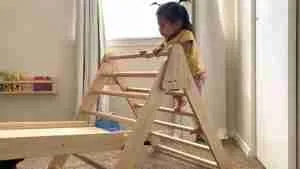
5 Best Montessori Climbing Toys For Infants And Toddlers
Montessori climbing toys help your child strengthen their muscles and improve their balance, coordination, and body control. These are the best Montessori climbing toys to help your child develop balance, coordination, and critical thinking skills.
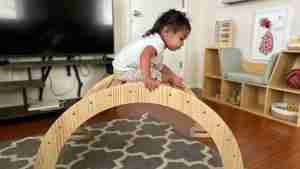
How To Introduce A Pikler Triangle To Your Baby
The best way to introduce a Pikler triangle to your baby is to allow them to touch it and naturally explore it.
